In a July 7, 2020, article in Public Square, I shared a reading list with commentary about books on race and racial discrimination. For almost three years now, I have been reading books about race, poverty, and gender discrimination in order to broaden my understanding of these topics. This second installment focuses on books about poverty, which is intertwined with racial and gender discrimination. Forty percent of children born in 2018 in the United States were born to unmarried women and single-parent families and their children constitute about one third of all people in poverty in the United States, so women are disproportionately bearing a huge burden of supporting these families.
These books answer in part the question, “Why don’t those people just work harder and then they would be more financially secure?” If there’s anything we can learn from a greater understanding of poverty in America, it is that hard work alone is not often enough to enable a person or family to make it, despite what we’ve been taught about the American dream and the overweening value of self-reliance. Even those who are eligible for every form of government help and who have the best jobs they can find are often unable to support themselves or their families in the degree of modest comfort and security they hope for. They are frequently caught up in webs of bureaucracy, racism, sexism, and scorn from people who don’t understand how difficult it is to get by when you start with very little or lose everything. People who are struggling to find employment may also be hindered by changes in the economy, lack of education, previous incarceration, language barriers, poor appearance, unreliable transportation, lack of proper clothing, homelessness, geographical distance from job opportunities, health problems and disability, and myriad other factors that those who are not poor may have trouble imagining. Against this backdrop, these people usually cannot simply choose to do better. We do others a terrible disservice when we assume that they have family or other resources that will come to their aid, or that they don’t want to work and are trying to get away with mooching off everyone else. Generally speaking, people don’t stop working or trying to work nor do they purposefully decrease their earned income because they get the assistance they need or even when they become rich.
We would have a more Zion-like society if we stopped worrying about who is getting benefits they don’t deserve and started worrying about who needs help and is not getting it.
I grew up in a single-mother household after my parents’ marriage ended when I was 7 years old. While I never feared we would go without basic food and shelter, I think my mother worried that we would. She needed to find a job—the court-ordered $100 per month total child support for my sister and me wasn’t going to go very far—and in 1964 she applied for work at a utility company in Amarillo, Texas, telling them she could type 100 words per minute. Fortunately, they didn’t give her a typing test, but she did have to ask a co-worker how to turn on the electric typewriter on her first day of work. She went on to manage the credit union of a large company in Dallas, but she never spent a day of her 53 years without wondering how we would get by financially. I had my own days of financial anxiety when I was putting myself through BYU—at best earning $100 a month as a part-time student secretary—and I have to credit the Lord with getting me through college, because there is no rational way to look back, count the cost, and see where the money came from. But I never came close to being as poor as some of the people in the books on the list below. I believe we would have a more Zion-like society if we stopped worrying about who is getting benefits they don’t deserve and started worrying about who needs help and is not getting it. In the midst of the COVID-19 pandemic, more people have learned in the worst way that one bad day or diagnosis can send a person into poverty and desperation; even with temporary help from the government and private charities, the future can look very bleak, a home can be lost in a matter of days, and health insurance is a luxury enjoyed mostly by people who are dependably employed.
One solution to this problem is for the rest of us to be even more generous and compassionate now, in our personal, social, and political lives. For believers, we must not wait for someone else to aid the poor; we covenanted at baptism to “bear one another’s burdens, that they may be light; … mourn with those that mourn; … and comfort those that stand in need of comfort” (Mosiah 18:8–9). The Zion society described in Fourth Nephi in the Book of Mormon was an ideal situation that lasted for four generations after the resurrected Christ established His Church in the New World. One characteristic of this place where “there could not be a happier people among all the people who had been created by the hand of God” was that “they had all things common among them, therefore they were not rich and poor …” (4 Nephi 1:3, 16).
Apostle D. Todd Christofferson taught:
It is supremely important to prepare the world for the Second Coming of Jesus Christ. When He comes, oppression and injustice will not only diminish; they will cease … . Poverty and suffering will not only decline; they will vanish … . Even the pain and the sorrow of death will be done away … . So yes, let us do all we can to relieve suffering and sorrow now, and let us devote ourselves more diligently to the preparations needed for the day when pain and evil are ended altogether.
If, in the ideal society, there are no poor people; if, indeed, in the Lord’s way to provide for all His saints, “the poor shall be exalted, in that the rich are made low” (D&C 104:16), we should look for ways to understand how bring the poor up and (although this idea will be painful to many) bring the rich down so that all share equally—ways consistent with the teachings of the gospel of Jesus Christ. Clearly, there are different ideas on how to do this—with thoughtful people not always agreeing on the best ways to support the poor or how to move towards more equitable prosperity. A beginning step is to understand our own and others’ lives by reading what has been written by those who have studied poverty, bias, and discrimination. The following is a list of books that have had a significant impact on me—and I leave after each one some commentary on my take-away thoughts. Other important books remain to be written and read; these are just a beginning.
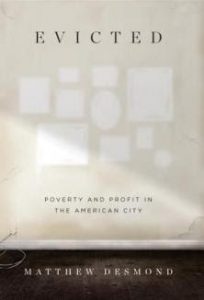
Matthew Desmond, Evicted: Poverty and Profit in an American City, 2017
This book is heartbreaking and angering—Americans are doing a terrible job of taking care of the poor, who face “housing insecurity” and very often can’t seem to get ahead without a miracle in the sometimes extortionate private rental market. Their poor choices and bad luck, as well as the shortage of public or subsidized housing, also keep them out of the inadequate public housing market. Everywhere they turn a new emergency can come up that results in eviction, constant moving, homelessness, job loss, terrible conditions—it just goes on. For example, if a tenant complains to a landlord that the heat doesn’t work or the plumbing is backed up, the landlord in some states can, without too much trouble, evict them and find a tenant who won’t complain about even the worst conditions. A lot of landlords are profiting from “grinding the faces of the poor,” as Isaiah called it. Other industrialized countries manage to deal with these problems, but here, as with healthcare, the United States falls short. The author, an ethnographer, lived in inner-city Milwaukee and paints a detailed portrait of the vicious downward spiral of poverty. He presents the facts and people’s stories and then his conclusions and recommendations. This is a brilliant book that is hard to read because the horrible circumstances are multiplied many times over in American cities and so little is being done.
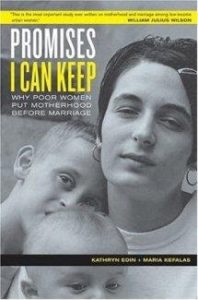
Kathryn Edin & Martha J. Kefalas, Promises I Can Keep: Why Poor Women Put Motherhood Before Marriage, 2005
This important book answers the question, “Why don’t those poor women get married before they have babies?” The authors were embedded in six impoverished African American, Puerto Rican, and white neighborhoods in Philadelphia for two years and interviewed hundreds of mothers. While the answers differ slightly for each ethnic group, the conclusions are that motherhood is one of the only ways of establishing a woman’s identity as a responsible adult in these neighborhoods (where women’s opportunities are so limited). The pool of marriage-able men is breathtakingly shallow, and motherhood is essential to these women—a life without children is a tragedy to them—but marriage is an ideal and a luxury that many dare not embark on without testing a man’s worth as a potential husband and without her own financial security. The actual conclusions are more nuanced than my summary, and the research is well-supported from a social science standpoint. The authors’ contrasts between the approach that many impoverished young women in the inner city decide makes sense compared to the attitudes that seem obvious to people with some financial security are especially valuable.
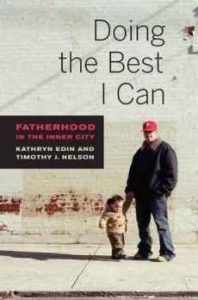
Kathryn Edin & Timothy J. Nelson, Doing the Best I Can: Fatherhood in the Inner City, 2013
This companion volume to Promises I Can Keep, which focused on inner-city single mothers, tells the story of inner-city single Philadelphia fathers, black and white, and their relationships to their children. These men are unable, due to economic and cultural restrictions and their own poor choices, to fulfill the traditional role of breadwinner for their children; therefore they “do the best they can” on the providing front while concentrating instead on having quality time and being a real father (as opposed to “just a paycheck”) for their children. That they sometimes aren’t good at this role does not mean that their attempts don’t have value for the children (and the men as well). Many of these fathers strongly feel the absence of their own fathers and are trying to make up for that with their children. Tragically, there is a tendency in some cases, when the fathering role does not work out with one child, for a man to turn his attention to another child with a different mother. Many fathers also expect their children’s mothers to be able to provide financially even if they cannot help, while the mothers are still expected to achieve all that is expected of mothers in terms of nurturing and emotional support—a very tough gig for mothers that does not result in financial or family security for children. Like the companion study, this book takes up the question, “Why don’t they just get married?” These impoverished (in almost every sense) adults have not given up on marriage, but instead have such high expectations of marriage that they cannot meet them. And yet, the rewards of having children are so great that they do not see any reason to go without them, and they do not consider that they are doing the children any disservice by bringing them into this less-than-perfect situation. Thus the father–child relationship becomes paramount, while the children’s mothers become almost irrelevant and sometimes an adversary to these fathers who are trying to do their best by their own lights. These two books explain a lot about circumstances that have been the subject of inaccurate assumptions by more fortunate people.
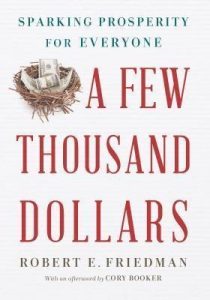
Robert E. Friedman, A Few Thousand Dollars: Sparking Prosperity for Everyone, 2018
This book makes the case for working to decrease income inequality and giving everyone a chance to seek education, home ownership, and create a business. This would be funded through “Prosperity Accounts,” which every American would have the opportunity to create; their savings would be matched by the government in differing ratios depending on where they fall in the current range of asset holding (from a 3:1 match for those in the lowest quintile of assets to a 0:1 match for those with abundant assets). We already construct our economy to favor some groups over others (such as through tax laws that often benefit the wealthy); Friedman suggests we could restructure it to give more people an equal chance to survive and to build wealth. Previous such programs that effectively helped people create wealth, like the Homestead Act and the G.I. Bill, excluded people of color and women (in practice and often by law), and the differing ranges of matching funds would make up for some of that past discrimination, which has contributed to gross income inequality. We could pay for these Prosperity Accounts by taxing capital gains as income, increasing the inheritance tax, changing the way we treat capital gains at death, and other measures that the author outlines in detail. These types of economic policies have greatly benefited the top 1 percent of Americans in terms of wealth and have left many of the rest struggling. Pilot programs have already established that poor people will save and thrive when they have a meaningful chance to invest in themselves and their families. Friedman argues that all it takes is a chance—even just a few thousand dollars.
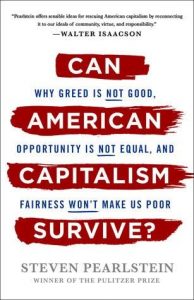
Steven Pearlstein, Can American Capitalism Survive? Why Greed Is Not Good, Opportunity is Not Equal, and Fairness Won’t Make Us Poor, 2018
This excellent book not only outlines problems with our economic system, but also suggests how we can fix things. The title is a bit of a teaser; the author is not opposed to capitalism but to the unfettered capitalism that increasing numbers argue has done and is doing so much damage. One of the author’s main points is that the American economy and society has been shaped by the idea that corporations are to be managed with the primary goal of maximizing profits for shareholders. That orientation is not legally required, and it exacerbates inequality and means that other stakeholders—the employees, the communities where the corporation is located, society in general—are not consistently considered in business decisions, with bad results. (And then, when circumstances lead to the failure of these corporations under the unfettered capitalism system, they often ask for government–that is, taxpayer-funded–bailouts!) This philosophy and others are matters of societal choice and could be changed to lead to a better and higher standard for public policy in the United States.
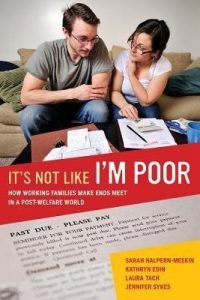
Sarah Halpern-Meekin, Kathryn Edin, Laura Tach, & Jennifer Sykes, It’s Not Like I’m Poor: How Working Families Make Ends Meet in a Post-Welfare World, 2015
Another excellent book about how Americans are poor or barely getting by, researched and written by Kathryn Edin and her colleagues. All but the most difficult-to-obtain government cash welfare payments ended in 1996, despite the continuing stereotypes of lazy people taking advantage of taxpayers. Now people are trying to get by on low-wage jobs and the cobbled-together possibility of other government benefits, none of which add up to enough to live on in even modest comfort. This book is persuasive about the importance of the Earned Income Tax Credit and Child Tax Credit, and the policy suggestions that the authors make at the end of the book are worth considering. This is a great example of how to do research in the social sciences, while allowing the reader to share the experiences of the subjects, who are treated with respect and compassion.
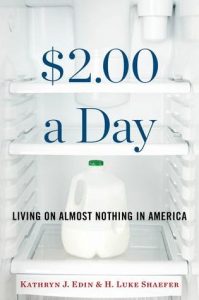
Kathryn J. Edin & H. Luke Shaffer, $2.00 a Day: Living on Almost Nothing in America, 2015
This wrenching book details the effects of the 1996 welfare reform on families who have subsequently struggled to find access to cash assistance and so are forced to go hungry, live in squalid conditions, and other circumstances that should never be the case. The story is told through the lives of families the authors interviewed in depth, as well as social science research. There are many expenses not covered by government assistance but necessary to survive and thrive: car repairs, laundromats, school supplies, clothing and shoes, bus fares, and the list goes on. People who want to work and are doing everything they can to feed, clothe, and house their families are unable to do so when the welfare program that is based on employment and jobs are unavailable or do not pay a living wage. Children are going hungry and suffering in many other ways. To alleviate these difficult situations, the authors propose that we should (1) raise the minimum wage; (2) require employers to post employee schedules at least three weeks in advance (because current on-demand scheduling prevents people from enrolling in school, obtaining a second job, and getting reliable childcare, among other problems); (3) require employers to guarantee a number of hours for their full- and part-time workers; (4) increase housing security and find ways to discourage predatory practices on the part of landlords (see the book Evicted: Poverty and Profit in the American City by Matthew Desmond for more about these); and (5) advertise the availability of TANF (Temporary Assistance to Needy Families) while reversing state practices of low funding and discouraging application practices for this emergency cash fund. An increase in and broadening of the availability of the Earned Income Tax Credit would also be helpful. Many people are struggling and suffering in the current situation; there are many ways to make things better.
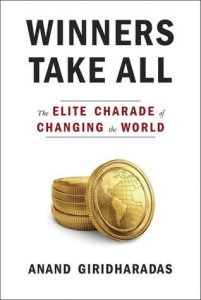
Anand Giridharadas, Winners Take All: The Elite Charade of Changing the World, 2018
The author takes a close look at private foundations and other organizations created by the “winners” who have gathered many assets and then seek to do good in the world—which they do. But the author and reader wonder if they have looked at how they earned the money they are now so generous with: Do they pay and treat their workers well? Do they exercise proper stewardship over the planet and its resources in the process of making money? Do they examine the inequality that frequently helped generate their wealth? Also, the author questions the pro-business orientation of so many of these philanthropic endeavors, to the point that they think market forces can solve all the problems of the world and that the best thing would be to minimize government almost to the point of non-existence and let unfettered capitalism fix everything. The problem with that unfettered capitalism is that democracy no longer has much of a place in determining priorities; at the same time, comparatively few wealthy people who can afford to lobby lawmakers are deciding the best way to alleviate many social problems. These well-off few also seem willing to look at approaches to problems only when those approaches don’t threaten the system that brought them so much wealth in the first place and helps them to keep it. This is a thought-provoking book that should sound the alarm about the obsession with making money that motivates so many individuals, corporate leaders, and government officials today. The idea that a corporation must be run for the primary benefit of its shareholders, without reference to the needs of the community of which is a part and the employees who work for it, is relatively recent and leads to dangerous distortions in the way society works—or doesn’t—for many people.
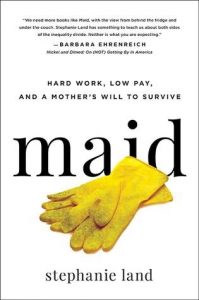
Stephanie Land, Maid: Hard Work, Low Pay, and a Mother’s Will to Survive, 2019
This memoir checked every box on the list of how hard it is to get by even with government assistance, a minimum wage job, and a child to support. Land left her violent husband, who fought her for custody of their young daughter (even though he’d encouraged the author to have an abortion and was outrageously abusive toward her). She had no family that she could depend on for help or encouragement. So many people treated her with unkind judgments: as though she were too lazy to work (although she was working hard, cleaning houses under terrible conditions); as though she were invisible and worthless; as though their status as taxpayers gave them the right to look down on her because she was getting what passes for government help in this country (huffing and whispering about her in the checkout lane and then shouting “you’re welcome” after she pays with food stamps). The book illustrates the difficulty of finding cash for things that government help doesn’t cover (clothes, car repairs, etc.); the pain of dropping her daughter off at daycare so she could work as a maid for people who had so much more; paradoxical criticism because her daughter was in daycare and she was working too much—or not enough; the lack of a safety net of any kind, where a $50 unexpected charge meant some other bill must go unpaid or a sick child had to go to daycare because there was no other care available; earning an extra $50 and therefore losing hundreds of dollars in government benefits because of this small temporary change in income—it is all there, and more. The United States could do so much more to help people in need; individuals and institutions could do so much better at not judging others and having more kindness. The author found a way to hope; I worry about the people who have no hope, especially in this era where cuts to social services and similar programs seem to be the norm.
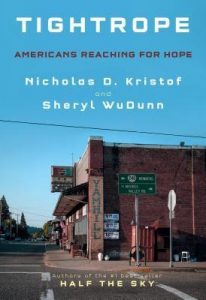
Nicholas Kristoff and Sheryl WuDunn, Tightrope: Americans Reaching for Hope, 2020
The authors begin with all the kids on Nicholas’s elementary school bus who have been lost to drugs and other despair and use their stories to show how these Americans have been tossed aside by the economy and other factors that have led to huge problems in the United States. They also recommend solutions. Their central point is that, although individuals are responsible for their choices, society and communities also bear responsibility for the abandonment of children to poverty and the failure to provide jobs and social services in this country. We could be doing a lot better, and it would save money and lives in the short and long runs.
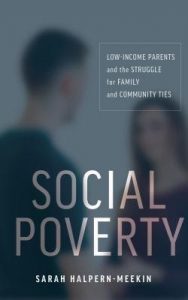
Sarah Halpern-Meekin, Social Poverty: Low Income Parents and the Struggle for Family and Community Ties, 2019
This excellent book demonstrates why thoughtlessly throwing money at people who are struggling with poverty and with troubled relationships is not enough (although the anti-poverty programs and the people in poverty could use much more funding). The author studied a program, “Family Expectations,” in Oklahoma City, which gives relationship education and other services to low-income couples who are expecting or have just had a child. While many of these people are struggling financially, they are also suffering from relationship poverty, or social poverty—without a sufficient community of trustworthy parents, extended family, friends, or others to fall back on when they need help or good examples. As a result, these are people who have had few role models for adequate relationships, for marriage or couplehood, or for parenting. The analysis of the program leads to a broader analysis of what people need and how these types of programs can help with the right mix of respect, education, practice, and models of kindness in a community of educators and learners.
The post Deepening Empathy, Compassion, and Understanding Through Reading, Part 2 appeared first on Public Square Magazine.
Continue reading at the original source →



